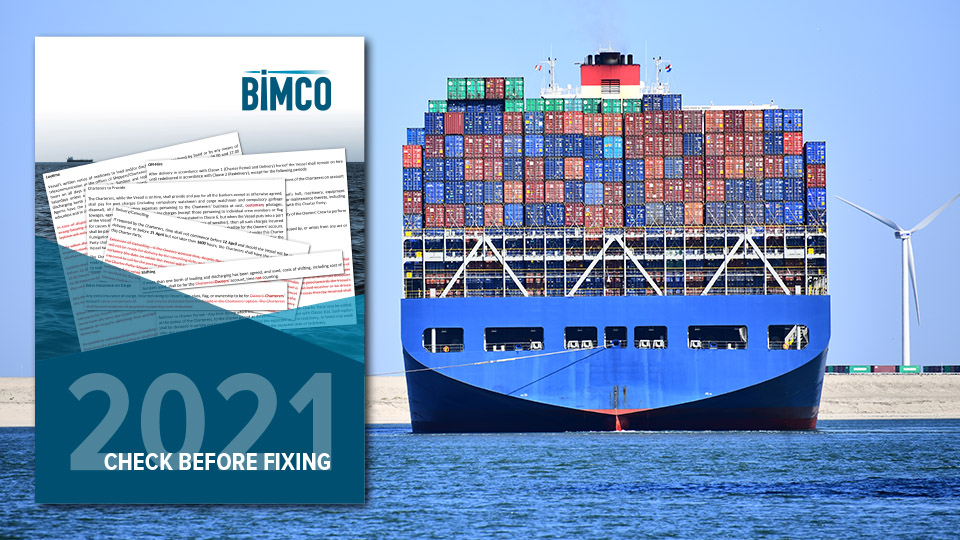Non-Payment of Hire Clause for Time Charter Parties 2006
Overview
Non-Payment of Hire Clause for Time Charter Parties 2006
BIMCO Non-Payment of Hire Clause for Time Charter Parties 2006
(a) If the hire is not received by the Owners by midnight on the due date, the Owners may immediately following such non-payment suspend the performance of any or all of their obligations under this Charter Party (and, if they so suspend, inform the Charterers accordingly) until such time as the payment due is received by the Owners. Throughout any period of suspended performance under this Clause, the Vessel is to be and shall remain on hire. The Owners' right to suspend performance under this Clause shall be without prejudice to any other rights they may have under this Charter Party.(b) The Owners shall notify the Charterers in writing within 24 running hours that the payment is overdue and must be received within 72 running hours from the time hire was due. If the payment is not received by the Owners within the number of running hours stated, the Owners may by giving written notice within 12 running hours withdraw the Vessel. The right to withdraw the Vessel shall not be dependent upon the Owners first exercising the right to suspend performance of their obligations under this Charter Party pursuant to sub-clause (a). Further, such right of withdrawal shall be without prejudice to any other rights that the Owners may have under this Charter Party.
(c) The Charterers shall indemnify the Owners in respect of any liabilities incurred by the Owners under the Bill of Lading or any other contract of carriage as a consequence of the Owners' suspension of and/or withdrawal from any or all of their obligations under this Charter party.
(d) If, notwithstanding anything to the contrary in this Clause, the Owners choose not to exercise any of the rights afforded to them by this Clause in respect of any particular late payment of hire or a series of late payments of hire, this shall not be construed as a waiver of their right either to suspend performance under sub-clause (a) or to withdraw the Vessel under sub-clause (b) in respect of any subsequent late payment under this Charter Party.
Explanatory note to Non-Payment of Hire Clause for Time Charter Parties
BIMCO has recently carried out a study of the various hire payment anti-technicality/grace period clauses that appear in many time charter parties. The purpose of the study has been to examine ways in which the use of anti-technicality and grace period clauses as regular hire payment “holidays” by less reputable charterers could be reduced or prevented.
The end result of the study has been the development of a new time charter party clause dealing specifically with non-payment of hire. Prior to the introduction of anti-technicality clauses an owner would have the right to withdraw his vessel from a time charter party immediately after midnight on the day hire was payable if the charterers, for any reason, failed to make payment. This rather draconian measure was softened by the introduction of the so-called “anti-technicality” clause.
This clause took into account the possibility that the charterers had arranged for payment of hire to be made but that the hire was delayed in its arrival at the owners’ bank by a technical failure or oversight in the banking system outside the control of the charterers. In recent years some time charter parties have incorporated simple “grace period” clauses with regard to hire which simply provide the charterers with an agreed extension to the payment date. Once the grace period lapses and if payment has not been received then, like the anti-technicality clause, the owners would be in a position to suspend performance or terminate the agreement provided proper notice was given.
The downside to these clauses has been that less-reputable charterers have, on occasion, taken advantage of the provision to withhold hire payments by several days each month or whenever it suited their purposes. To address this potential problem the new BIMCO Non-Payment of Hire Clause gives owners the right, if they so choose, to immediately suspend performance under a timecharter following a failure by the charterers to pay hire when due.
In drafting the new Clause due consideration has been given to recent case law - namely the “Pamela”, [1995] 2 Lloyds Rep. 249 and the “Li Hai” [2005] 2 Lloyds Rep. 389.
These cases indicated that:
- In the absence of any indication to the contrary, the time for payment will expire at midnight on the due date; and
- It is necessary to make it abundantly clear when issuing a notice for late payment of hire that, in the absence of payment, the vessel will be withdrawn.
Sub-clause (a) of the new Non-Payment of Hire Clause deals with suspension of performance. The provision reflects the “midnight-rule” in that if payment of hire is not received by midnight on the due date then the owners may suspend performance. It should be noted that the owners are not obliged to suspend performance – it is merely a right that they can exercise if they so wish and if circumstances dictate such a measure. It is recognized that many owners have good and well-established relationships with charterers and would not wish to prejudice their business relationships for a minor oversight easily resolved by a quick phone call. The owners are not required to give formal notice to the charterers that they are suspending performance. They are, however, required to let the charterers know that performance has been suspended if they choose to exercise their right.
The suspension of part or all of the services under the charter party is seen as a powerful commercial tool which can provide effective leverage in getting the charterers to make the necessary overdue payment or payments.
Sub-clause (b) deals with withdrawal of the vessel whereby the owners must give the charterers a formal ultimatum within 24 running hours of non-payment stating that the outstanding hire should be received within 72 running hours of being due – failing which the owners will give notice of withdrawal. It should be noted that recent cases have emphasized the importance of giving clear and unambiguous notices in this respect. Any owner contemplating withdrawing a vessel from a time charter would be well advised to first consult with their P&I Club or legal counsel. Sub-clause (b) also makes it clear that the owners’ right to withdraw is not dependent upon a previous suspension of performance.
Sub-clause (c) provides the owners with an indemnity from the charterers in respect of any liabilities under a bill of lading that the owners might incur as a result of suspension and/or withdrawal of the vessel. This provision is similar to the indemnities found in the anti-technicality and grace period clauses found in other time charter parties and is an essential feature.
Finally, sub-clause (d) relates to the owners’ right to apply the provisions of the Clause to subsequent late payments even if the owners do not exercise their rights on an earlier default.
Originally published in BIMCO Special Circular No. 4, 31 August 2006 - Non-Payment of Hire Clause for Time Charter Parties
Related Help & Advice
Create or edit a contract
The one-stop digital shop for all the standard maritime contracts and clauses you’ll ever need.
Latest Related News
-
BIMCO adopts portfolio of four ETS clauses
The shipping industry is facing an increase in new regulations from the International Maritime Organization (IMO) and the European Union (EU) and an increase in the urgency to decarbonise. To support the industry, BIMCO has developed a portfolio of new emission trading scheme (ETS) clauses.
-
BIMCO adopts new CII clause for Voyage Charter Parties
The shipping industry is facing an increase in new regulations from the International Maritime Organization (IMO) and the European Union (EU) and an increase in the urgency to decarbonise. To support the industry, BIMCO has developed a new CII Clause for Voyage Charter Parties. The clause was adopted by BIMCO’s Documentary Committee on 11 October and is the latest addition to BIMCO’s portfolio of carbon clauses.
-
BIMCO’s CII clause adopted
The BIMCO Documentary Committee has adopted a CII Operations Clause for Time Charter Parties which will help the industry commercially navigate the complexities of the new CII regulations from the International Maritime Organization (IMO).
-
Fumigation
BIMCO providing information and guidance relating to fumigation of cargoes that are shipped under the IMSBC Code, the Grain Code and the IMDG Code.
-
Bottom fouling
From time to time, BIMCO is approached by members enquiring about responsibility for the cleaning of a ship’s underwater parts when it has been idle at a port for a long time pursuant to the orders of the time charterers.
ELSEWHERE ON BIMCO
Holiday calendar
BIMCO's Holiday Calendar covers general holidays in over 150 countries, plus local holidays and working hours in more than 680 ports around the world.
Learn about your cargo
For general guidance and information on cargo-related queries.




